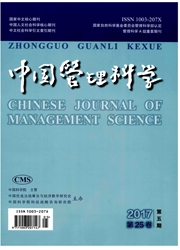

 中文摘要:
中文摘要:
本文基于高阶梯队理论,针对以往CEO更换研究的关键问题,探讨ST公司新任CEO特征、高管团队调整以及企业绩效提升之间的关系。本研究选择了沪深两市2000-2010期间被ST特殊处理后更换CEO的110个样本进行实证研究,研究结果表明,ST公司新任CEO的继任年龄、受教育水平对企业短期绩效变化有显著正向影响,过去未担任过CEO的新任CEO继任后企业短期绩效的提升明显好于过去担任过CEO的,内部继任的新任CEO继任后企业长期绩效的改善明显好于外部继任的,高管团队调整对企业短期绩效变化有显著正向影响,新任CEO特征对高管团队调整没有显著影响。本研究为绩效下滑企业转型战略研究提供了一个新的视角,也为中国企业选择和更换CEO提供了决策的依据。
 英文摘要:
英文摘要:
Based on Upper Echelons Perspective, key problems of previous researches on CEO succession are studied to analyze relationship among ST listed enterprises' new CEO characteristics, TMT adjustment and enterprise performance changes. We choose 110 CEO succession samples from listed enterprises which replace CEO from 2000 to 2010 are chosen in the empirical research,and it can be found that new CEO age and education level have significant positive effects on enterprise short-term performance changes. New CEO without working experience as CEO can better improve short-term performance than the CEO with relevant experience. New CEO from internal can better improve long-term performance than CEO from ex- ternal. TMT adjustment has a significant positive effect on short-term performance changes, but new CEO's characteristics have no significant effect on TMT adjustment. This study provides a new perspec- tive for researches about transformation strategy of performance declined enterprises, and also provides a basis for Chinese enterprises to select and replace CEO.
 同期刊论文项目
同期刊论文项目
 同项目期刊论文
同项目期刊论文
 期刊信息
期刊信息
